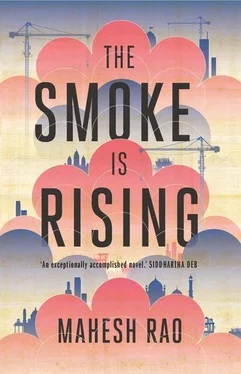‘It’s easy for people like you to talk. It’s not that easy to police the lines. Plus the rich farmers’ groups are very powerful in delivering votes. So they will always get what they want.’
Mala had followed Lavanya into the kitchen.
‘Where was the need to bring all these fruits? So formal you’ve become,’ said Lavanya. Then, turning to the maid: ‘Manju, put these fruits in the fridge. And that basket you can take. You might need it for something.’
In spite of the fact that Mala was married to the elder of the brothers, her age, background and experience meant that a recalibration of familial norms had been necessary. Certainly, that much had become evident the first time she had met Lavanya, a week before her wedding.
‘You will not have any problems in Mysore,’ Lavanya had said, while adjusting Mala’s pallu . ‘Anand knows everyone.’
Mala had quickly learnt that her role in her relationship with Lavanya was to be that of an eager pupil, curious and admiring in equal measure. For her part, Lavanya would by turn explain or advise, treating Mala with a complacent grace. Mala was sure that as long as she stuck to these parameters, she would be able to avoid any potential unpleasantness or conflict. She had the measure of the intricate difficulties in Girish’s relationship with his brother and sister-in-law and she now felt responsible for preventing any manifestations of his prickly discontentment in their presence. Her powers were circumscribed but she could certainly play the part she had been assigned with an earnest vigour.
Lavanya reached for a brochure that was resting on the microwave.
‘Look Mala, I want to show you something. But please, we haven’t told people so not a word to anyone, okay?’
Mala looked at the brochure’s thick sleeve: an aerial shot of an arc of glittering villas set in a landscape of palms and jewelled lawns. The name of this Shangri-La was Terra Blanca, ‘Mysore’s most exclusive lifestyle enclave’ according to the serpentine calligraphy on the first page. Mala began to turn the pages reverentially.
‘I didn’t even know they had such places in India,’ she said.
‘Yes,’ breathed Lavanya, as if Mala’s comment had buried within it a primal truth.
‘Are you thinking of moving here?’ asked Mala.
‘Not thinking! We have already booked one of the villas on the western side of the development,’ said Lavanya.
‘Really? I can’t believe it!’
‘Really, really, really!’
‘These houses, I mean villas, are amazing but this is also such a nice house in such a good area. Will you really sell it and leave?’
‘Mala, this place was good for us but our needs are also changing. The main thing is security. They have 24-hour armed guards and cameras at Terra Blanca and they are very careful about whom they let in. Shruthi can play outside with no problems. And you know, they are also very strict about who can buy a house there. We will be with other people like us.’
Mala’s face was a picture of elation.
‘And just look at the facilities. There’s an excellent school there, a shopping complex, a cinema and a mini-amphitheatre for weddings and other functions,’ continued Lavanya, seizing the brochure and jabbing at the relevant pages.
‘The swimming pools look so nice,’ said Mala.
‘Everything is nice! Look at the fitness centre and the spa. And it even has its own medical facility and fire department.’
Mala reached out for the brochure, like she would for an infant. As she thought up a few more questions to ask Lavanya, she allowed herself to be relieved that the conversation was taking place in the kitchen.

As Uma walked home, the wind grew stronger, filling the air with a fine sediment that lodged itself in the corners of her eyes and coated the roof of her mouth. It was Saturday evening and there was already a huddle of early drinkers trying to attract the attention of the man behind the counter at Raksha Wines. A woman sitting on the pavement had clearly given up the struggle for the time being. As Uma walked past her, she looked up, her eyes raw with need. Uma glanced at her and kept walking.
Emerging from the chaos outside Raksha Wines, a man in his thirties, with a face like a pair of pincers, called out to Uma.
‘Eh, don’t pretend you can’t hear me,’ he yelled at her receding form.
The man was a local fixer. In the greasy world of municipal graft, his was one of a number of names that could prove useful in ensuring a desired outcome. Providing all due funds were made available on time, his areas of expertise were legion: a speedy landline connection, multiple SIM cards without proof of address, an expedited income certificate from the tahsildar’s office, domestic gas cylinders without delay and the prompt registration of land title documents. His weekend swagger was not one produced by large quantities of local whiskey, but instead by the sense of distinction that came from providing a public service in a mutilated system.
Uma needed nothing from that world and had no reason to stop to see what the man wanted. She paused outside an unassuming temple, tucked into a small courtyard next to a printing press. The temple was frequented exclusively by the low caste inhabitants of the surrounding sprawl. Others preferred to worship at the two temples on the main road, where presumably the deities were better equipped to deal with the ordinary concerns of members of the upper castes. It was time for the evening aarthi and a long but orderly queue stretched out of the temple entrance. Uma decided not to join the queue. Instead she slipped off her chappals in the road, folded her palms and bowed her head in prayer.
A few minutes later she was making her way down the row to her room. A number of children nearly crashed into her on the narrow path as they raced towards the hill leading up to Mysore Junction; there were rumours of fireworks. The white belt of one of the girls’ dresses had come undone and fallen into a pool of dirty water outside the door of Uma’s room. She picked it up and laid it flat across the top of a tyre that had been left leaning against the wall.
Uma’s room was in darkness. The power cut had already lasted over two hours and it was entirely possible that it would continue through the night. The monsoons had still not arrived and the water levels remained low in all the hydroelectric dams that served the state. Uma lit a candle below the picture of Shiva. She picked up a cloth hanging on a hook, dipped it into a bucket of water and dabbed at her upper arms. She lifted her hair up and swabbed the back of her neck, her upper chest and her face. She then moved to the washing area and poured a judicious amount of water on to her feet, massaging her arches and running a finger deep into the crevices between her toes. Picking up a towel, she wiped her feet dry and then lay on the mattress.
The wind outside sounded like silk being ripped. Under the picture of Shiva, the candle’s flame shrank into a blue bead before leaping back to illuminate the unplastered brickwork behind it. The top of Shiva’s face was in shadow but Uma could see his palm raised in approbation. She forced herself to concentrate on the hand and its munificence. The flame’s rhythms grew less erratic and the dim light began to pull on Uma’s temples and cheeks, gradually drawing her into a murky delirium far beyond sleep.
It was a reverberation at the door that restored her to the darkness of the room. The flame had died and all she could make out were the sky’s distant pleats in the gap between the wall and the roof. The wind had dropped but a different sound had taken its place: what seemed like the leaden resonance of a man’s voice imitating the wind. Uma turned on to her side and faced the door. The sound faded. Moments later she started as something clattered against the door, perhaps a handful of gravel. She slowly sat up, her eyes shut, listening. All she could make out was the barking of a faraway dog, steady and mechanical. She continued to sit upright, her arms clasped around her knees, computing the textures of the night.
Читать дальше













